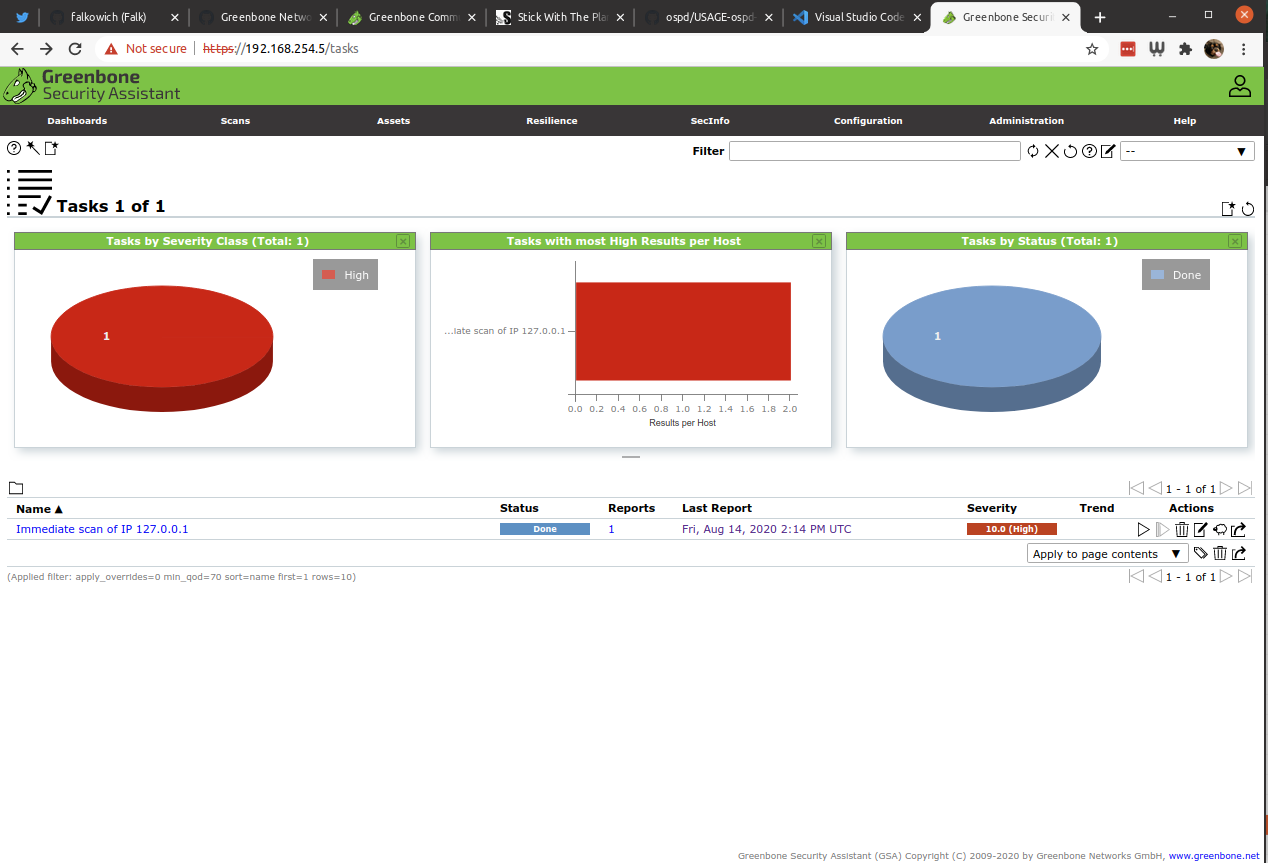Install Greenbone Vulnerability Manager 20.08 on Debian 10 from source...
Aug 14, 2020BIG THANKS
First of all, thanks to Greenbone and their community for the wunderful work with the software and project!
And this guide could not be possible without the help of all nice people in the comments and in the slackchannel
Edits:
This is the fixes by the Community throu PR’s on. https://github.com/falkowich/sadsloth_gvm_public
A huge thanks for the below fixex.
- 2021-05-09 - Lots of great fixes by cfi-gb from Greenbone. A huge thanks for your time to help out with this!:
- 2021-03-27 - Fix feed sync command by Chartman123:
Caveats:
- I am no experienced debian user, so this may contain errors. Pls do not hesitate to tell me in comments or slack.
- Not so much testing made yet, If you test it out and you find something, please leave a message in the comments or slack
Like the last guides:
This installation is not made for public facing servers, there is no built in security in this setup.
I take no responsibility if this guide bork you server, burn your house down to ashes, make your christmas tree self combust or makes your cat to leave you..
It’s under the “it worked for me[tm]” clause.
This is as always a work in progress.
Preparation is key
Prepare lots of coffee and (if at home) put on your best comfy clothes.
When writhing this, The Umbrella Academy - playlist was streaming out in the speakers.. (Great serie with great music imho)
Fire up an vanilla Debian 10 on a vm for some testing and start the installation.
I picked the netinst cd
Install nothing but ssh-server and “standard system utilities”, no root password (disabled root, like ubuntu server installation)
This is a fresh install howto, not howto upgrade or migrate old data. Hopefully we can make one after this?
This writeup assumes:
- A normal user with sudo privileges.
- Root user
- A non privileged user named gvm
- The prefix for the installation is /opt/gvm

fixing locales
I have some trouble with my locales sv_SE.UTF-8, so I have to run this to get everything running as planned.
From https://www.thomas-krenn.com/en/wiki/Perl_warning_Setting_locale_failed_in_Debian
sudo locale-gen en_US.UTF-8 ;\
export LC_ALL="C"
install requirements
sudo apt update ;\
sudo apt -y dist-upgrade ;\
sudo apt -y autoremove ;\
sudo apt install -y software-properties-common ;\
sudo apt install -y cmake pkg-config libglib2.0-dev libgpgme-dev libgnutls28-dev uuid-dev libssh-gcrypt-dev \
libldap2-dev doxygen graphviz libradcli-dev libhiredis-dev libpcap-dev bison libksba-dev libsnmp-dev \
gcc-mingw-w64 heimdal-dev libpopt-dev xmltoman redis-server xsltproc libical-dev postgresql \
postgresql-contrib postgresql-server-dev-all gnutls-bin nmap rpm nsis curl wget fakeroot gnupg \
sshpass socat snmp smbclient libmicrohttpd-dev libxml2-dev python-polib gettext rsync xml-twig-tools \
python3-paramiko python3-lxml python3-defusedxml python3-pip python3-psutil virtualenv vim git libunistring-dev ;\
sudo apt install -y texlive-latex-extra --no-install-recommends ;\
sudo apt install -y texlive-fonts-recommended ;\
curl -sS https://dl.yarnpkg.com/debian/pubkey.gpg | sudo apt-key add - ;\
echo "deb https://dl.yarnpkg.com/debian/ stable main" | sudo tee /etc/apt/sources.list.d/yarn.list ;\
sudo apt update ;\
sudo apt -y install yarn
create user
echo 'export PATH="$PATH:/opt/gvm/bin:/opt/gvm/sbin:/opt/gvm/.local/bin"' | sudo tee -a /etc/profile.d/gvm.sh ;\
sudo chmod 0755 /etc/profile.d/gvm.sh ;\
source /etc/profile.d/gvm.sh ;\
sudo bash -c 'cat << EOF > /etc/ld.so.conf.d/gvm.conf
# gmv libs location
/opt/gvm/lib
EOF'
sudo mkdir /opt/gvm ;\
sudo adduser gvm --disabled-password --home /opt/gvm/ --no-create-home --gecos '' ;\
sudo usermod -aG redis gvm # This is for ospd-openvas can connect to redis.sock.. If you have a better idea here, pls write in the comments :) ;\
sudo chown gvm:gvm /opt/gvm/ ;\
sudo su - gvm
mkdir src ;\
cd src ;\
export PKG_CONFIG_PATH=/opt/gvm/lib/pkgconfig:$PKG_CONFIG_PATH
Download stuff
git clone -b gvm-libs-20.08 --single-branch https://github.com/greenbone/gvm-libs.git ;\
git clone -b openvas-20.08 --single-branch https://github.com/greenbone/openvas.git ;\
git clone -b gvmd-20.08 --single-branch https://github.com/greenbone/gvmd.git ;\
git clone -b master --single-branch https://github.com/greenbone/openvas-smb.git ;\
git clone -b gsa-20.08 --single-branch https://github.com/greenbone/gsa.git ;\
git clone -b ospd-openvas-20.08 --single-branch https://github.com/greenbone/ospd-openvas.git ;\
git clone -b ospd-20.08 --single-branch https://github.com/greenbone/ospd.git
install gvm-libs
cd gvm-libs ;\
export PKG_CONFIG_PATH=/opt/gvm/lib/pkgconfig:$PKG_CONFIG_PATH ;\
mkdir build ;\
cd build ;\
cmake -DCMAKE_INSTALL_PREFIX=/opt/gvm .. ;\
make ;\
make doc ;\
make install ;\
cd /opt/gvm/src
config and build openvas-smb
cd openvas-smb ;\
export PKG_CONFIG_PATH=/opt/gvm/lib/pkgconfig:$PKG_CONFIG_PATH ;\
mkdir build ;\
cd build/ ;\
cmake -DCMAKE_INSTALL_PREFIX=/opt/gvm .. ;\
make ;\
make install ;\
cd /opt/gvm/src
config and build scanner
cd openvas ;\
export PKG_CONFIG_PATH=/opt/gvm/lib/pkgconfig:$PKG_CONFIG_PATH ;\
mkdir build ;\
cd build/ ;\
cmake -DCMAKE_INSTALL_PREFIX=/opt/gvm .. ;\
make ;\
make doc ;\
make install ;\
cd /opt/gvm/src
Fix redis for default openvas install
Here be dragons
Remember to become root
For this become almight root. Preferably log in to another ssh session as your normal user with sudo rights.
sudo su
export LC_ALL="C" ;\
ldconfig ;\
cp /etc/redis/redis.conf /etc/redis/redis.orig ;\
cp /opt/gvm/src/openvas/config/redis-openvas.conf /etc/redis/ ;\
chown redis:redis /etc/redis/redis-openvas.conf ;\
echo "db_address = /run/redis-openvas/redis.sock" > /opt/gvm/etc/openvas/openvas.conf ;\
systemctl enable redis-server@openvas.service ;\
systemctl start redis-server@openvas.service
sysctl -w net.core.somaxconn=1024
sysctl vm.overcommit_memory=1
echo "net.core.somaxconn=1024" >> /etc/sysctl.conf
echo "vm.overcommit_memory=1" >> /etc/sysctl.conf
cat << EOF > /etc/systemd/system/disable-thp.service
[Unit]
Description=Disable Transparent Huge Pages (THP)
[Service]
Type=simple
ExecStart=/bin/sh -c "echo 'never' > /sys/kernel/mm/transparent_hugepage/enabled && echo 'never' > /sys/kernel/mm/transparent_hugepage/defrag"
[Install]
WantedBy=multi-user.target
EOF
systemctl daemon-reload ;\
systemctl start disable-thp ;\
systemctl enable disable-thp ;\
systemctl restart redis-server
As openvas will be launched from an ospd-openvas process with sudo, the next configuration is required in the sudoers file:
visudo
Edit the secure_path line to this.
Defaults secure_path="/usr/local/sbin:/usr/local/bin:/usr/sbin:/usr/bin:/sbin:/bin:/opt/gvm/sbin"
Add this line to allow the created gvm user to launch openvas with root permissions.
### Allow the user running ospd-openvas, to launch openvas with root permissions
gvm ALL = NOPASSWD: /opt/gvm/sbin/openvas
Then exit from the root shell, and go back to to the gvm user
Here be dragons
Remember to change from root to gvm user
update nvt
greenbone-nvt-sync
Here be dragons
If you get an error here, run greenbone-nvt-sync multiple times.
upload plugins in redis with openvas
openvas -u
Tip
This is going to take some time depending on your hardware.
You can watch openvas and redis-server processes using alot of cpu when this is running.
PID USER PR NI VIRT RES SHR S %CPU %MEM TIME+ OMMAND
27796 gvm 20 0 105356 26436 3720 R 80.0 0.7 0:17.00 penvas
27605 redis 20 0 144856 86600 3200 S 21.7 2.1 0:06.23 redis-server
config and build manager
cd gvmd ;\
export PKG_CONFIG_PATH=/opt/gvm/lib/pkgconfig:$PKG_CONFIG_PATH ;\
mkdir build ;\
cd build/ ;\
cmake -DCMAKE_INSTALL_PREFIX=/opt/gvm .. ;\
make ;\
make doc ;\
make install ;\
cd /opt/gvm/src
Configure PostgreSQL
For this we will use the sudo enabled user. (not root)
Then setup permissions
sudo -u postgres bash
export LC_ALL="C"
createuser -DRS gvm
createdb -O gvm gvmd
psql gvmd
create role dba with superuser noinherit;
grant dba to gvm;
create extension "uuid-ossp";
create extension "pgcrypto";
exit
exit
Exit the sudo user shell.
fix certs
Here be dragons
Remember to change from sudo user to gvm user
gvm-manage-certs -a
create admin user
To create user admin with password admin is a bad habit, but for this guide it has a purpose when doing the first test scan on localhost remember to change later!
gvmd --create-user=admin --password=admin
config and update feeds
Here we have some news in 20.08.
From the Install.md “Certain resources that were previously part of the gvmd source code are now shipped via the feed. An example is the config “Full and Fast”. “gvmd will only create these resources if a “Feed Import Owner” is configured:”
Find out what uuid your newly created admin is.
gvm@gvm2008-lab:/opt/gvm/src$ gvmd --get-users --verbose
admin 41f853e4-fecf-423f-85b7-18fa3396bac5 ««« This uuid
Then modify gvmd settings with the uuid from above.
gvmd --modify-setting 78eceaec-3385-11ea-b237-28d24461215b --value 41f853e4-fecf-423f-85b7-18fa3396bac5
Run these lines one at the time
greenbone-feed-sync --type GVMD_DATA
greenbone-feed-sync --type SCAP
greenbone-feed-sync --type CERT
Here be dragons
This script breaks alot for me lately, so you can be forced to run greenbone-feed-sync --type [and the type] multiple times.
configure and install gsa
cd gsa ;\
export PKG_CONFIG_PATH=/opt/gvm/lib/pkgconfig:$PKG_CONFIG_PATH ;\
mkdir build ;\
cd build/ ;\
cmake -DCMAKE_INSTALL_PREFIX=/opt/gvm .. ;\
make ;\
make doc ;\
make install ;\
touch /opt/gvm/var/log/gvm/gsad.log ;\
cd /opt/gvm/src
OSPD-OPENVAS
install the virtualenv
cd /opt/gvm/src ;\
export PKG_CONFIG_PATH=/opt/gvm/lib/pkgconfig:$PKG_CONFIG_PATH ;\
virtualenv --python python3.7 /opt/gvm/bin/ospd-scanner/ ;\
source /opt/gvm/bin/ospd-scanner/bin/activate
install ospd
mkdir /opt/gvm/var/run/ospd/ ;\
cd ospd ;\
pip3 install . ;\
cd /opt/gvm/src
install ospd-openvas
cd ospd-openvas ;\
pip3 install . ;\
cd /opt/gvm/src
create startupscripts
As root run these
Here be dragons
Remember to become root
cat << EOF > /etc/systemd/system/gvmd.service
[Unit]
Description=Open Vulnerability Assessment System Manager Daemon
Documentation=man:gvmd(8) https://www.greenbone.net
Wants=postgresql.service ospd-openvas.service
After=postgresql.service ospd-openvas.service
[Service]
Type=forking
User=gvm
Group=gvm
PIDFile=/opt/gvm/var/run/gvmd.pid
WorkingDirectory=/opt/gvm
ExecStart=/opt/gvm/sbin/gvmd --osp-vt-update=/opt/gvm/var/run/ospd.sock
ExecReload=/bin/kill -HUP $MAINPID
KillMode=mixed
Restart=on-failure
RestartSec=2min
KillMode=process
KillSignal=SIGINT
GuessMainPID=no
PrivateTmp=true
[Install]
WantedBy=multi-user.target
EOF
cat << EOF > /etc/systemd/system/gsad.service
[Unit]
Description=Greenbone Security Assistant (gsad)
Documentation=man:gsad(8) https://www.greenbone.net
After=network.target
Wants=gvmd.service
[Service]
Type=forking
PIDFile=/opt/gvm/var/run/gsad.pid
WorkingDirectory=/opt/gvm
ExecStart=/opt/gvm/sbin/gsad --drop-privileges=gvm
Restart=on-failure
RestartSec=2min
KillMode=process
KillSignal=SIGINT
GuessMainPID=no
PrivateTmp=true
[Install]
WantedBy=multi-user.target
EOF
cat << EOF > /etc/systemd/system/ospd-openvas.service
[Unit]
Description=Job that runs the ospd-openvas daemon
Documentation=man:gvm
After=network.target redis-server@openvas.service
Wants=redis-server@openvas.service
[Service]
Environment=PATH=/opt/gvm/bin/ospd-scanner/bin:/opt/gvm/bin:/opt/gvm/sbin:/opt/gvm/.local/bin:/usr/local/sbin:/usr/local/bin:/usr/sbin:/usr/bin:/sbin:/bin
Type=forking
User=gvm
Group=gvm
WorkingDirectory=/opt/gvm
PIDFile=/opt/gvm/var/run/ospd-openvas.pid
ExecStart=/opt/gvm/bin/ospd-scanner/bin/python /opt/gvm/bin/ospd-scanner/bin/ospd-openvas --pid-file /opt/gvm/var/run/ospd-openvas.pid --unix-socket=/opt/gvm/var/run/ospd.sock --log-file /opt/gvm/var/log/gvm/ospd-scanner.log --lock-file-dir /opt/gvm/var/run/
Restart=on-failure
RestartSec=2min
KillMode=process
KillSignal=SIGINT
GuessMainPID=no
PrivateTmp=true
[Install]
WantedBy=multi-user.target
EOF
systemctl daemon-reload ;\
systemctl enable gvmd ;\
systemctl enable gsad ;\
systemctl enable ospd-openvas ;\
systemctl start ospd-openvas ;\
systemctl start gvmd ;\
systemctl start gsad
Check that the services are up and running
systemctl status gvmd
systemctl status gsad
systemctl status ospd-openvas
Exit your root session
Modify your Default scanner
As user gvm, get Default scanner UUID
Here be dragons
Remember to change from root to gvm user
(ospd-scanner) gvm@localhost:/opt/gvm/src$ gvmd --get-scanners
08b69003-5fc2-4037-a479-93b440211c73 OpenVAS /var/run/ospd/ospd.sock 0 OpenVAS Default «««««««««« THIS UUID
6acd0832-df90-11e4-b9d5-28d24461215b CVE 0 CVE
Then modify the scanner
(ospd-scanner) gvm@localhost:/opt/gvm/src$ gvmd --modify-scanner=08b69003-5fc2-4037-a479-93b440211c73 --scanner-host=/opt/gvm/var/run/ospd.sock
Scanner modified.
Now you can point your browser to GSA https://ipnumberofyourserver and login
Try out a scan with the wizard.
If you scan 127.0.0.1 and have not changed the user/pass you should get:

Tip
If your NVT’s are empty. This can be because the VT database isn’t updated.
To check what gvmd is doing, tail the gvmd-log and see what the latest output is.
gvm@gvm2008-lab:/opt/gvm/src$ tail /opt/gvm/var/log/gvm/gvmd.log -f
md manage: INFO:2020-08-14 14h10.25 utc:29896: Updating /opt/gvm/var/lib/gvm/cert-data/dfn-cert-2015.xml
md manage: INFO:2020-08-14 14h10.25 utc:29896: Updating /opt/gvm/var/lib/gvm/cert-data/CB-K13.xml
md manage: INFO:2020-08-14 14h10.25 utc:29896: Updating /opt/gvm/var/lib/gvm/cert-data/CB-K15.xml
md manage: INFO:2020-08-14 14h10.25 utc:29896: Updating /opt/gvm/var/lib/gvm/cert-data/CB-K17.xml
md manage: INFO:2020-08-14 14h10.25 utc:29896: Updating /opt/gvm/var/lib/gvm/cert-data/CB-K19.xml
md manage: INFO:2020-08-14 14h10.25 utc:29896: Updating /opt/gvm/var/lib/gvm/cert-data/CB-K18.xml
md manage: INFO:2020-08-14 14h10.26 utc:29896: Updating /opt/gvm/var/lib/gvm/cert-data/CB-K14.xml
md manage: INFO:2020-08-14 14h10.26 utc:29896: Updating /opt/gvm/var/lib/gvm/cert-data/CB-K20.xml
md manage: INFO:2020-08-14 14h10.26 utc:29896: Updating /opt/gvm/var/lib/gvm/cert-data/CB-K16.xml
md manage: INFO:2020-08-14 14h10.26 utc:29896: Updating Max CVSS for DFN-CERT
md manage: INFO:2020-08-14 14h10.27 utc:29896: Updating DFN-CERT CVSS max succeeded.
md manage: INFO:2020-08-14 14h10.27 utc:29896: Updating Max CVSS for CERT-Bund
md manage: INFO:2020-08-14 14h10.28 utc:29896: Updating CERT-Bund CVSS max succeeded.
md manage: INFO:2020-08-14 14h10.28 utc:29896: sync_cert: Updating CERT info succeeded.
md manage: INFO:2020-08-14 14h13.01 utc:29895: Updating VTs in database ... 61397 new VTs, 0 changed VTs
md manage: INFO:2020-08-14 14h13.03 utc:29895: Updating VTs in database ... done (61397 VTs).
The line you shall see when the db is updated is Updating VTs in database ... done (61397 VTs)
If you have any questions, fixes or enhanchments. Submit a PR in the repo [link], comment below or join slack and see if someone knows the answer you seek :)
» Slack invite here
And remeber to change the password for the admin user.
Troubleshooting. And debugging
For lab I ususally use tmux, so I can start the services in the frontend. Tmux cheatsheet in a gist courtesy of henrik » tmux_cheatsheet.markdown
gvmd
As gvm user.
tmux new -s gvmd
gvmd -f --osp-vt-update=/opt/gvm/var/run/ospd.sock
gsad
And then as a sudo user. (perhaps this is fixable with editing the sudoers file later.)
tmux new -s gsad
sudo gsad --drop-privileges=gvm -f
ospd-openvas
ospd-openvas -f --pid-file /opt/gvm/var/run/ospd-openvas.pid \
--unix-socket=/opt/gvm/var/run/ospd.sock \
--log-file /opt/gvm/var/log/gvm/ospd-scanner.log \
--log-level DEBUG
After some Coffee, it’s time for taking a ride in our self renovated little car :)
